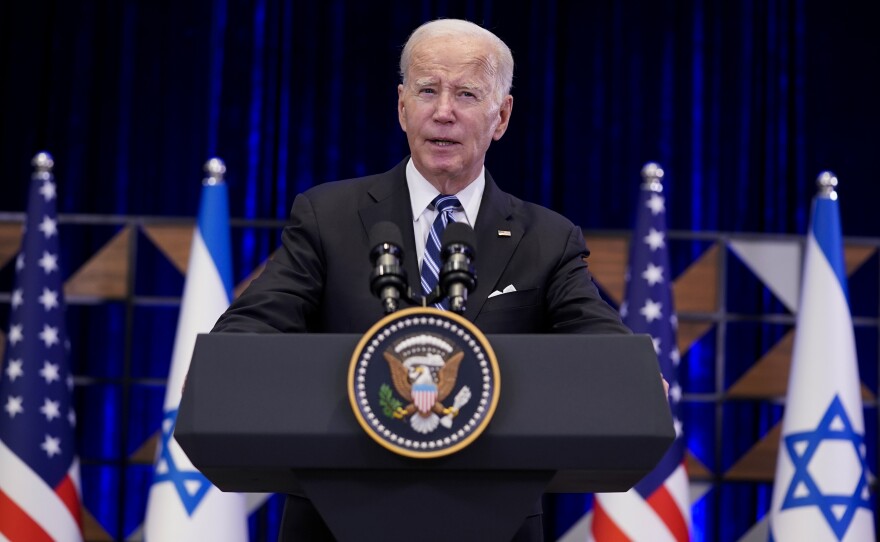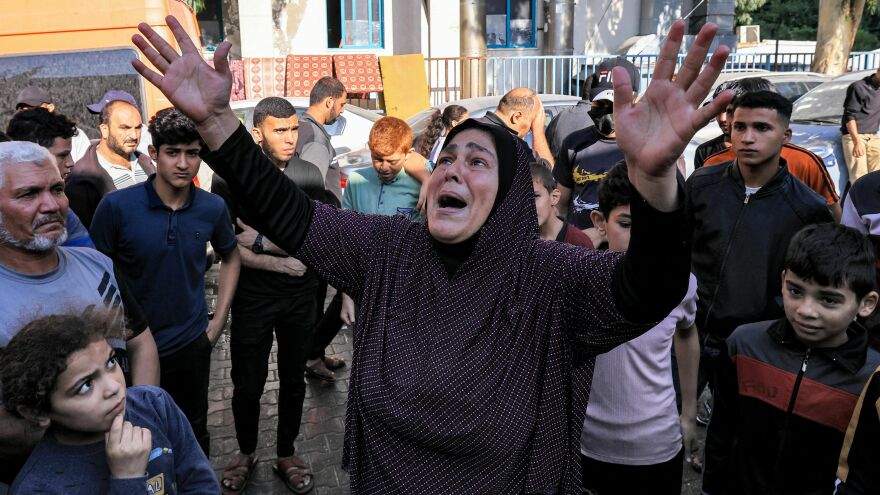Updated October 18, 2023 at 3:42 PM ET
For updates on President Biden's visit, follow NPR's live blog.
JERUSALEM – President Biden reaffirmed unwavering U.S. commitment to Israel's security during his visit to the country on Wednesday but cautioned Israelis not to be consumed by rage, as protests spread across the Middle East against Israel's bombardment and siege of the Gaza Strip.
Biden's visit appeared to yield some gains for besieged Palestinians who say they are slowly dying of thirst and are without medicine, electricity or enough food following a complete Israeli siege of Gaza.
Israel said Wednesday that in light of American support for Israel's war effort, and Biden's request for basic humanitarian assistance, Israel would allow only food, water and medicine to reach the civilian population in southern Gaza.

But the government did not say that fuel would be allowed in to power hospital generators and Gaza's main power plant, which shut down last week. Israel says aid would only be allowed to reach southern Gaza — and not northern Gaza or Gaza City, areas Israel has ordered Palestinians to evacuate from.
If any aid reaches Hamas, the flow of aid into Gaza will be stopped, Israel's government said.
Israel has called up hundreds of thousands of reservists, who are now massed at its border with Gaza for a likely ground offensive. The escalation follows a deadly attack by Hamas militants from the Gaza Strip on Israel nearly two weeks ago.
Biden slams Hamas, backs Israel
Biden slammed Hamas, saying its attack on Israelis on Oct. 7 was similar to past terrorist attacks on the U.S., but he also said that "the vast majority of Palestinians are not Hamas."
His comments came amid concerns across the region that the volatility could spread to other Mideast countries.
A planned summit after his visit to Israel between Biden and leaders from Egypt, Jordan and the Palestinian Authority was canceled after a deadly explosion at a hospital in Gaza Tuesday evening killed hundreds of people, many of them displaced families and children in the hospital's courtyard where they had sought shelter from Israeli airstrikes. Israel and the Palestinians have traded blame for it.
Biden acknowledged the shock, pain and rage Israelis felt after seeing their loved ones killed by militants.
"We've seen it described as Israel's 9/11," Biden said. "But for a nation the size of Israel," he added, the losses equate to 15 attacks on the scale of Sept. 11 in the U.S.
"Justice must be done," Biden said. "But I caution this: while you feel that rage, don't be consumed by it."
"After 9/11, we were enraged in the United States while we sought justice and got justice. We also made mistakes," he said while in Tel Aviv.
He reiterated U.S. support for a two-state solution.
Tragedy at hospital precedes Biden's visit
Biden's visit to Israel comes the morning after a catastrophic explosion at a hospital in the Gaza Strip killed hundreds of people. The hospital in Gaza City, where Israel's military had ordered a complete evacuation of its residents, was being used as a shelter by families with nowhere else to go.
Grim images depicting children's bodies and bloodied, limbless women and men spread across social media and Arabic satellite TV channels, sparking protests across the Middle East from Morocco to Iran.
The blast and the protests mark a dramatic turn in the 12-daylong war that began when Hamas fighters from the Gaza Strip broke through its barrier with Israel and killed 1,400 people in Israel and took some 200 people hostage. Entire Israeli communities in the south were destroyed in the assault.
Since those attacks, some 3,500 people, a third of them children, have been killed by Israeli bombardment, according to the Palestinian Health Ministry. More than 12,000 people have been wounded. Those casualty figures do not include the victims of the Al Ahli hospital blast.
Another 1,300 people across Gaza are missing, presumed dead or still alive under the rubble of thousands of homes that have been destroyed.
U.N. Secretary-General António Guterres is calling for an immediate humanitarian cease-fire, warning the fate of the entire region hangs in the balance.
Still, Israel continues to launch airstrikes on Gaza, including in the wake of the hospital blast and as Biden met with grieving Israeli families in Tel Aviv.
Hamas, meanwhile, continues to launch rockets at Israeli cities. Israel's Iron Dome defense system intercepts most. Air raid sirens are frequently heard in cities like Tel Aviv and Jerusalem.
Israel and Palestinians trade blame over hospital blast
Israel vehemently denied any involvement in Tuesday night's blast at the Christian Al Ahli Arab hospital.
Israeli army spokesman Daniel Hagari told reporters late Tuesday that an initial internal review showed it was a misfired rocket from Gaza based on footage from Israeli drones and chatter among militants calling it a PIJ misfire.
"We don't see a direct hit at the hospital, we see kind of a hit in the parking lot but we're still finishing the investigation of that," he said.

Hamas and the Palestinian Islamic Jihad group in Gaza say the attack was carried out by an Israeli warplane. Arab governments, including Egypt, Saudi Arabia and the UAE also blame Israel.
Biden told Israeli Prime Minister Benjamin Netanyahu in Tel Aviv that it appears as though the strike against the hospital "was done by the other team, not by you."
"But there's a lot of people out there who aren't sure," Biden added.
He was asked by reporters what made him confident in accepting Israel's explanation that it was not behind the hospital explosion. He replied: "The data I was shown by my defense department."
Regional tensions flare
The Biden administration has been attempting to prevent the violence from spreading to the other parts of the region, but a meeting that was scheduled in Jordan with Biden and the leaders of Jordan, Egypt and the Palestinian Authority was cancelled by Arab leaders almost immediately after the hospital blast.
The White House said the president looks "forward to consulting in person with these leaders soon, and agreed to remain regularly and directly engaged with each of them over the coming days."
Hamas described the explosion at the hospital as a massacre that "also exposes the American and Western support for this criminal occupation." Hamas called on Muslims and Arabs across the world to protest and rally against Israel.
Protests erupted after the hospital disaster in Egypt, Jordan, Iraq and Lebanon. There were also large protests in Turkey and Iran, to name a few.
Protesters took the streets of Palestinian cities in the occupied West Bank. Protesters in Ramallah chanted slogans against Israel and the Palestinian Authority leadership as police tried to disperse them.
Scenes of carnage at Gaza hospital
Footage online and carried on Arabic satellite news channels like Al-Jazeera showed the carnage of dead bodies strewn on the grass outside the hospital as grieving and wounded parents wailed in grief over the bodies of their dead kids. Children were shown taking their last breaths or being treated without painkillers, which have run out across hospitals in Gaza.
In a news conference, senior Health Ministry official in Gaza, Dr. Yousef Abu Al-Reesh, stood at a podium surrounded by the dead bodies of children. Some were covered in blood-stained shrouds, while others were not.
Before the Al Ahli hospital was hit, Israel had shelled the hospital twice, causing some damage, he said. This was followed by a warning from Israel asking why the hospital had not yet been evacuated, he added.
Dr. Fadel Naim, a doctor at Al Ahli hospital, told NPR doctors were operating on patients when they heard a loud explosion. He ran outside and saw dead and wounded everywhere.
"We tried to help who we can help. Some of them died in our hands," he said. Many were missing limbs and bleeding out," Dr. Naim said.
"We found one baby on the roof of the hospital," he said, describing the horrific scene and impact of the explosion. "Many babies died yesterday. Many babies."
Egypt warns of regional chaos if war isn't contained
Reports emerged that Israel's ambassador to Egypt was leaving the country as tensions spike. When Israel's foreign ministry was asked about this, an official simply replied with "no comment".

Egypt's President Abdel-Fattah el-Sissi said Wednesday that any notion or idea that Palestinians in the Gaza Strip could be pushed or relocated to Egyptian territory is dangerous.
"The whole idea is that moving Palestinians to Sinai is simply moving the idea of resistance, the idea of killing, to Sinai," he said. "And then Sinai becomes a base for operations against Israel."
He said this could quickly spiral and pull Egypt and Israel into conflict.
Any attempt to displace Palestinians in the Gaza Strip could also lead to Palestinians in the West Bank being pushed into Jordan, el-Sissi said in opening remarks for a joint press conference with German Chancellor Olaf Scholz in Cairo on Wednesday.
El-Sissi said if that happens, the creation of a Palestinian state wouldn't be possible because there would be land but no people.
"I warn against this scenario," he said.
People remain trapped in Gaza, awaiting aid from outside
In Gaza City, which falls under Israel's evacuation notice, many people simply cannot leave or refuse to, citing the lack of safety anywhere in Gaza.
Medical student Tasneen Ahl's home in Gaza City has already been destroyed in this war. She and dozens of family members, including 10 children, remain the city, though. She says her family isn't leaving because hundreds of people have been killed in the south after evacuating there.
A U.N. shelter where thousands of Palestinians were seeking refuge was also struck by Israel on Tuesday, killing six people, according to the U.N. agency for Palestinian refugees.
"There's no place here in Gaza we can go. We can't. We can't leave our home," Ahl told NPR.
The U.N. relief works agency, OCHA, says every person in Gaza is estimated to have less than a gallon of water for all their needs per day, including for drinking, hygiene and cooking. That's in part because water and sanitation facilities have been severely damaged.
Ahl says the last time she drank a sip of water was over 24 hours ago. Ahl says her father walked over a mile to source flour for bread. The family is cooking on woodfire because of power outages.
"I can't see my family like this. We are dying slowly," she said, before adding the are "no human rights" for people in Gaza.
NPR staffers Aya Batrawy reported from Jerusalem, Bill Chappell reported from Washington, D.C., and Ruth Sherlock contributed reporting from Tel Aviv, Israel.
Copyright 2023 NPR. To see more, visit https://www.npr.org.



